Family name: Juncaginaceae L. Richard
Synonym(s): Lilaeaceae Dumort., nom. cons.; Triglochinaceae Bercht. & J. Presl
Common name(s): arrow-grass family
*Number of genera/species: 3/34
List of genera records in GRIN-Global
fruit
Fruit an acheneachene:
a dry, indehiscent, one-seeded fruit, with seed attached to pericarp at a single point, derived from a single, superior, simple or compound, one-loculed ovary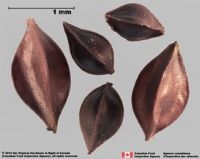 , single or aggregated into a schizocarpschizocarp:
, single or aggregated into a schizocarpschizocarp:
usually dry fruit splitting between two or more locules to form distinct, indehiscent, usually one seeded segments; fruit derived from a single, superior or inferior, compound ovary; compare to mericarp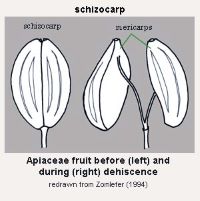 , 1.5–8.5 mm long, globoseglobose:
, 1.5–8.5 mm long, globoseglobose:
3D shape—more or less spherical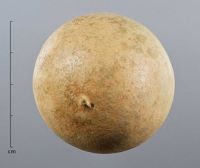 to angularangular:
to angularangular:
2D shape—having sides that meet at acute or obtuse angles
, tereteterete:
approximately circular in cross section; width and thickness approximately equal
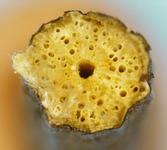 , angledangular:
, angledangular:
2D shape—having sides that meet at acute or obtuse angles
, or compressedcompressed:
flattened; in grasses, used to denote compression (not necessarily flattened) either laterally or dorsiventrally
in transection, sometimes beakedbeak:
a usually firm, terminal appendage, sometimes tapered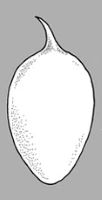 with persistent stylestyle:
with persistent stylestyle:
in a flower, the narrow and elongated part of the pistil between the stigma and the ovary; sometimes persisting in fruit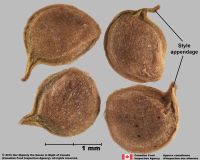 (Tetronicum), with one seed. Pericarppericarp:
(Tetronicum), with one seed. Pericarppericarp:
fruit wall or fruit coat
brown, dulldull:
reflecting only a low proportion of incident light, with no apparent sheen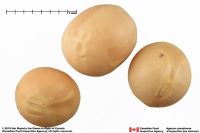 , leatheryleathery:
, leatheryleathery:
texture—moderately thick, tough, and very pliable
, smooth, ribbedribbed:
surface relief—wide, prominent, linear ridges that are generally rounded and longitudinally situated on the surface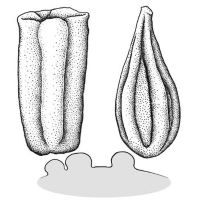 , rarely with apicalapical:
, rarely with apicalapical:
at or pertaining to the end of the seed or fruit distal from its point of attachment (i.e., base)
hooks or hornshorn:
a straight or curved, slenderly conic or conoidal protrusion, resembling an animal horn
.
Triglochin species except for T. scilloides have three sterilesterile:
lacking male and/or female reproductive parts; also, not producing fruit or seed
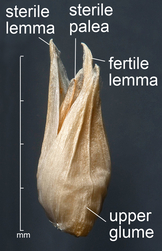 carpels that alternate with three fertile carpels, which at maturity break up into three one-seeded mericarpsmericarp:
carpels that alternate with three fertile carpels, which at maturity break up into three one-seeded mericarpsmericarp:
a one-seeded section (carpel) of a schizocarp, as in Apiaceae fruits (compare schizocarp)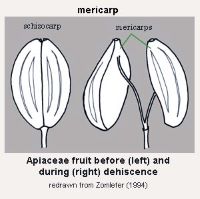 (achenesachene:
(achenesachene:
a dry, indehiscent, one-seeded fruit, with seed attached to pericarp at a single point, derived from a single, superior, simple or compound, one-loculed ovary ) attached at the apexapex:
) attached at the apexapex:
the point farthest from the point of attachment, or the "tip" of an organ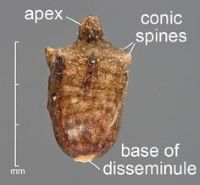 . Triglochin scilloides achenesachene:
. Triglochin scilloides achenesachene:
a dry, indehiscent, one-seeded fruit, with seed attached to pericarp at a single point, derived from a single, superior, simple or compound, one-loculed ovary are flattened to angularangular:
are flattened to angularangular:
2D shape—having sides that meet at acute or obtuse angles
and three-winged.
Seeds linearlinear:
(shape) long, narrow, and uniform in width; (of embryo) embryo is straight and much longer than wide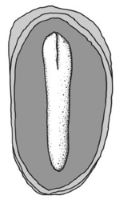 , oblongoblong:
, oblongoblong:
2D shape—much longer than broad with nearly parallel sides, corners are rounded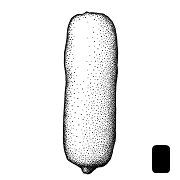 , or ovoidovoid:
, or ovoidovoid:
3D shape—ovate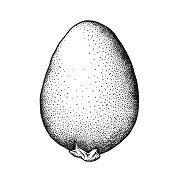 , tereteterete:
, tereteterete:
approximately circular in cross section; width and thickness approximately equal
 in transection. Seed coat brown.
in transection. Seed coat brown.
Embryo well developed, linearlinear:
(shape) long, narrow, and uniform in width; (of embryo) embryo is straight and much longer than wide , straight or bentbent:
, straight or bentbent:
(of embryo) embryo is bent at an acute, V-shaped angle with the ends close together and generally thick cotyledons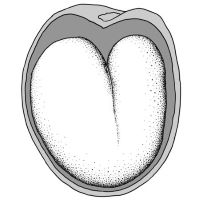 , completely filling seed coat, with a massive cotyledoncotyledon:
, completely filling seed coat, with a massive cotyledoncotyledon:
a primary leaf of the embryo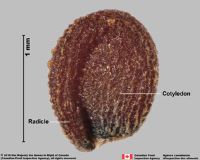 , a laterallateral:
, a laterallateral:
(of embryo) embryo lies along the side of the seed, generally towards one end; of, at, or from the side; in grasses, can refer to the sides adjacent to the dorsal and ventral sides
stem tip, and terminal radicleradicle:
the embryonic root of the embryo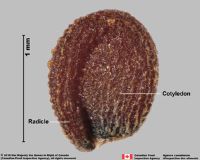 .
.
Endosperm lacking.
| Fruit | |
| Type | acheneachene: a dry, indehiscent, one-seeded fruit, with seed attached to pericarp at a single point, derived from a single, superior, simple or compound, one-loculed ovary  |
| Size range | 1.5–8.5 mm long |
| Shape(s) | ellipsoidellipsoid: 3D shape—elliptic , cylindricalcylindrical: 3D shape—a cylinder, with parallel sides and a circular cross-section; tubular or rod-shaped , trigonoustrigonous: 3D shape—having three faces that meet at distinct angles; triangular in outline , globoseglobose: 3D shape—more or less spherical  , lanceoloidlanceoloid: , lanceoloidlanceoloid:3D shape—lanceolate , oblateoblate: depressed globose , cylindricalcylindrical: 3D shape—a cylinder, with parallel sides and a circular cross-section; tubular or rod-shaped , angularangular: 2D shape—having sides that meet at acute or obtuse angles , linearlinear: (shape) long, narrow, and uniform in width; (of embryo) embryo is straight and much longer than wide  , ovoidovoid: , ovoidovoid:3D shape—ovate  |
| Texture | leatheryleathery: texture—moderately thick, tough, and very pliable |
| Surface relief | ribbedribbed: surface relief—wide, prominent, linear ridges that are generally rounded and longitudinally situated on the surface  or with hookswith hooks: or with hookswith hooks:bristles or spines with curved or backwards pointing tips, or with secondary bristles along their length 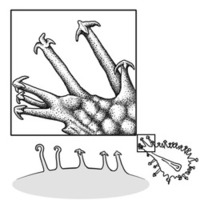 or hornshorn: or hornshorn:a straight or curved, slenderly conic or conoidal protrusion, resembling an animal horn |
| Color(s) | brown |
| Unique features | Variously shaped, leatheryleathery: texture—moderately thick, tough, and very pliable , smooth or ribbedribbed: surface relief—wide, prominent, linear ridges that are generally rounded and longitudinally situated on the surface  achenesachene: achenesachene:a dry, indehiscent, one-seeded fruit, with seed attached to pericarp at a single point, derived from a single, superior, simple or compound, one-loculed ovary  , rarely with apicalapical: , rarely with apicalapical:at or pertaining to the end of the seed or fruit distal from its point of attachment (i.e., base) hooks or hornshorn: a straight or curved, slenderly conic or conoidal protrusion, resembling an animal horn . |
| Seed | |
| Shape(s) | linearlinear: (shape) long, narrow, and uniform in width; (of embryo) embryo is straight and much longer than wide  , oblongoblong: , oblongoblong:2D shape—much longer than broad with nearly parallel sides, corners are rounded  , or ovoidovoid: , or ovoidovoid:3D shape—ovate  |
| Color(s) | brown |
| Other | |
| Embryo | well developed, linearlinear: (shape) long, narrow, and uniform in width; (of embryo) embryo is straight and much longer than wide  , straight or bentbent: , straight or bentbent:(of embryo) embryo is bent at an acute, V-shaped angle with the ends close together and generally thick cotyledons  , completely filling seed coat, with a massive cotyledoncotyledon: , completely filling seed coat, with a massive cotyledoncotyledon:a primary leaf of the embryo  , a laterallateral: , a laterallateral:(of embryo) embryo lies along the side of the seed, generally towards one end; of, at, or from the side; in grasses, can refer to the sides adjacent to the dorsal and ventral sides stem tip, and terminal radicleradicle: the embryonic root of the embryo  |
| Nutritive tissue | endosperm lacking |
Worldwide.
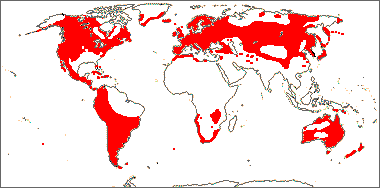
Distribution map courtesy of Angiosperm Phylogeny Website.
Baskin and Baskin 2021Baskin and Baskin 2021:
Baskin C and Baskin J. 2021. Relationship of the lateral embryo (in grasses) to other monocot embryos: A status up-grade. Seed Science Research 31 (3): 199-210. doi:10.1017/S0960258521000209; Dahlgren et al. 1985Dahlgren et al. 1985:
Dahlgren RMT, Clifford HT, and Yeo PF. 1985. The families of the monocotyledons: structure, evolution, and taxonomy. Springer-Verlag, Berlin. 520 pp.; Flora of Australia 2021+Flora of Australia 2021+:
Flora of Australia. Australian Biological Resources Study, Canberra. Accessed January 2021–March 2024. URL: http://www.ausflora.org.au; Kirkbride et al. 2006Kirkbride et al. 2006:
Kirkbride JH, Jr, Gunn CR, and Dallwitz MJ. 2006. Family guide for fruits and seeds, vers. 1.0. Accessed September 2020-January 2022. URL: https://nt.ars-grin.gov/seedsfruits/keys/frsdfam/index.cfm .; Kubitzki et al. 1990+Kubitzki et al. 1990+:
Kubitzki K et al., eds. 1990+. The families and genera of vascular plants. 7+ vols. Berlin etc.; Stevenson and Loconte 1995Stevenson and Loconte 1995:
Stevenson DW and Loconte H. 1995. A cladistic analysis of monocot families. In: Rudall PJ, Cribb PJ, Cutler DF, and Humphries CJ, eds. Monocotyledons: Systematics and Evolution. Royal Botanic Gardens, Kew.; Tutin et al. 1964–1980Tutin et al. 1964–1980:
Tutin TG, Burges NA, Chater AO, Edmondson JR, Heywood VH, Moore DM, Valentine DH, Walters SM, and Webb DA (eds.) 1964–1980. Flora Europaea. 5 vols. Cambridge University Press, Cambridge UK. 2,524 pp.; Watson and Dallwitz 1992+Watson and Dallwitz 1992+:
Watson L and Dallwitz MJ. 1992+. The families of flowering plants: descriptions, illustrations, identification, and information retrieval. Version: 6th Accessed September 2020-September 2022. URL: delta-intkey.com
*The number of genera and species is based on Christenhusz and Byng 2016Christenhusz and Byng 2016:
Christenhusz MJM and Byng JW. 2016. The number of known plant species in the world and its annual increase. Phytotaxa 261 (3): 201-217. https://doi.org/10.11646/phytotaxa.261.3.1, which may differ from the number of genera in GRIN-Global.